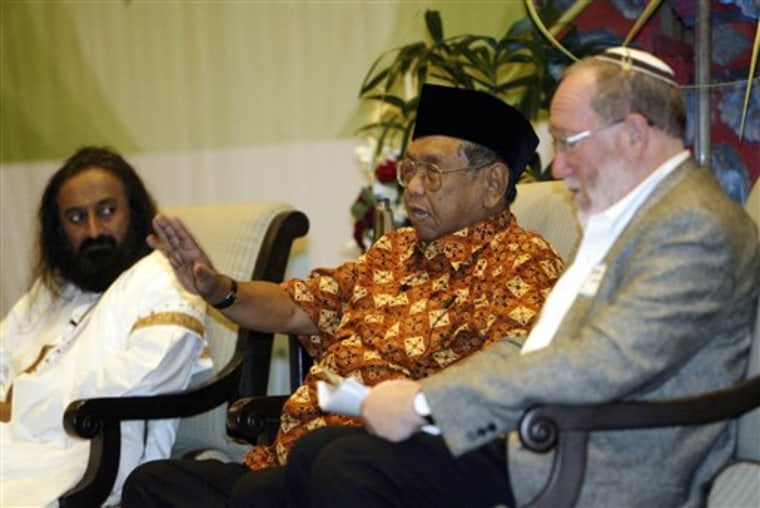A Jewish Holocaust survivor made a plea for tolerance Tuesday at a conference in the world’s most populous Muslim nation that also brought together religious leaders and victims of attacks by Islamic extremists.
One of the goals of the meeting was to counter a December conference hosted by Iranian President Mahmoud Ahmadinejad that tried to cast doubt on the killing of an estimated 6 million Jews during World War II.
“I hope people will learn from the past,” said Sol Teichman, 79, who was a teenager living in Czechoslovakia when his city was occupied first by the Hungarian army and then the Germans. “We should try to improve life instead of destroying it.”
The daylong gathering on Bali island was attended by high-profile moderate Indonesian Muslim leaders, including former President Abdurraham Wahid, and Hindu spiritual head Sri Sri Ravi Shankar, as well as Buddhist teachers, a Jesuit priest and rabbis.
Victims of a terrorist attack in Israel and of suicide bombings by Muslim militants on Bali in 2005 were among participants. More than 220 people have died from two attacks in Bali.
‘Ways to promote tolerance and understanding’
“It has been difficult for me to excuse in my heart those who committed this act,” said Tumini, a Balinese woman who was severely burned when al-Qaida-linked militants targeted two nightclubs in 2002. She said she still has not recovered emotionally, physically or financially.
Wahid, who was Indonesia’s leader from 1999 to 2001, said it was important that people have the courage to speak the truth, even if it angered some.
“Although I’m a good friend of Ahmadinejad, I have to say that he is wrong,” he said. “I visited Auschwitz’s Museum of Holocaust and I saw many shoes of dead people. Because of this, I believe the Holocaust happened.”
His daughter, Yenny, who is a prominent supporter of liberal Islam, said it was up to Muslims “to bring religion back to its original intention ... to underline the importance of finding shared values.”
“We have to find ways to promote tolerance and understanding for mankind,” she said.
‘Push a little harder’
Bali is a mostly Hindu enclave in Indonesia, which has some 190 million Muslims, more than any other nation in the world. Its government is secular and most people are moderate, although a vocal militant fringe has grown louder in recent years.
The conference was sponsored by the Libforall Foundation, a U.S. based non-governmental organization that seeks to counter Muslim extremism in the Islamic world by supporting religious moderates, and the Wiesenthal Center’s Museum of Tolerance.
Teichman said he lost 70 family members to the Nazis, including his sister, brothers and grandparents, and was taken to Auschwitz, Warsaw, Dachau, Kaufering and Landsberg concentration camps before allied forces liberated them in 1945.
He said Ahmadinejad’s decision to host a conference in December questioning whether the Holocaust took place made him want to “push a little harder to meet Muslim leaders.”
